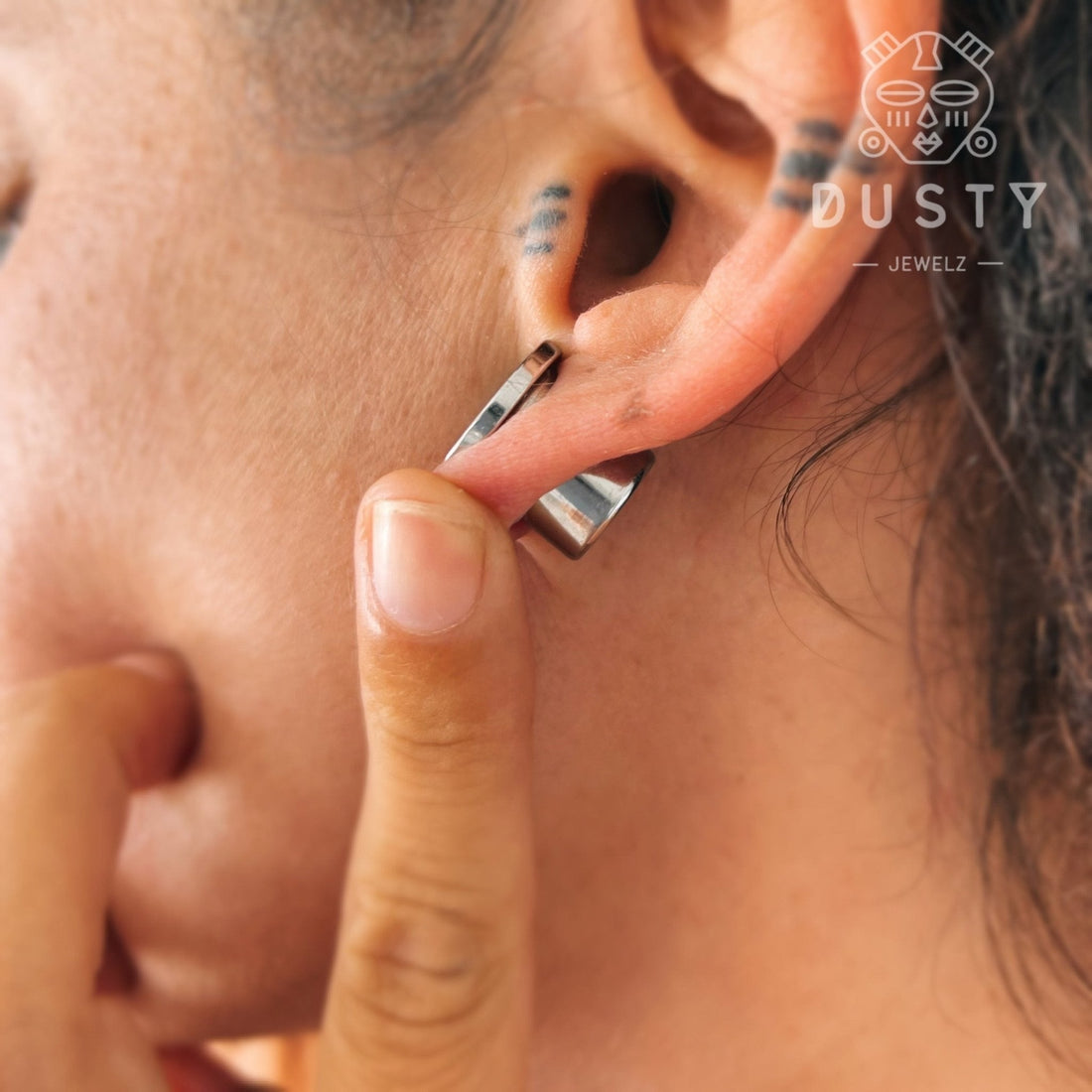
Ear Stretching
Share
Ear Stretching Lingo 101: A Newbie's Crash Course
New to ear stretching? Whether you're just starting out your journey or brushing up on the basics, this guide is here to help you understand the essential terminology behind plugs, tunnels, gauges, and everything in between.
At DustyJewelz, we believe in making body modification safe, stylish, and easy to understand. This guide breaks down the most common terms you'll encounter when shopping for stretched ear jewellery-so you can stretch smarter, shop better, and wear your pieces with confidence.
Key Ear Stretching Terms Explained
STRETCHING
Expanding the ear piercings diameter involves stretching. The process is straightforward. Utilizing patience and appropriate tools, you progressively enlarge the piercing size to accommodate stylish jewelry.
PLUGS
Plugs or Flesh plugs are essential for ear stretching, like art for your lobes. They come in all colors and designs, like vinyl for your ears!
TUNNELS
A hollow version of a plug, letting light (and eyes) pass through. Lightweight and breathable.
TAPERS
A conical tool used to gradually stretch your piercing. Only for the stretching process—not long-term wear.
EAR WEIGHTS
Decorative, heavier pieces that hang from stretched lobes. Stylish, but best worn occasionally to avoid long-term damage.
EAR GAUGES
Jewelry thickness is measured in gauges; smaller numbers mean larger sizes. After 00g, measurements switch to mm or inches. The term 'ear gauges' is a misnomer, but the community isn't too strict. 'Gauge' refers to size and stretching.
PINCHERS
Pinchers are versatile additions to your ear stretching toolkit, doubling as stretching aids and jewelry. Choose from vibrant acrylics or sleek polished metals for a stylish alternative.
TEARDROPS
Teardrops bring a distinctive touch to your jewelry, telling a unique story. They stand out with their eye-catching teardrop shape, rather than the traditional circle. Careful consideration may be needed for sizing, but when done right, your ears will shine as masterpieces.
DEAD STRETCHING
Steel or glass plugs that come in smaller increments then the usual 2mm increments. Our Dead plugs come in as little as 1mm - 0.5mm. From sizes 1mm all the way up to 38mm. This is a safer way of stretching as you do it much slower than with the force of the usual tapers.
DOUBLE FLARE
Jewelry flared on both ends—stays in place without O-rings. Requires a fully healed, well-stretched piercing.
SINGLE FLARE
Flared on one end, secured with an O-ring on the other. Easier to insert than double flares.
NO FLARE (STRAIGHT PLUGS)
Jewelry without flares. Held in place with O-rings. Great for new stretches.
WEARABLE AREA
The wearable area is the segment of your jewelry situated within your piercing. It's the intermediary space between your flares or o-rings - the area that directly contacts your skin.
O-RING
A small rubber ring that holds jewelry in place. Used with single-flare and no-flare plugs.
MILLIMETERS
Millimetres (mm) are used in measuring the ear stretching journey, serving as the BPM of your stretch and crucial for understanding its scale.
GAUGE
Introducing gauges (g) – the counterpart to millimetres in the world of measurement. Gauges serve the same function, with the distinction of being imperial compared to the metric system of millimetres. This can be particularly challenging for those in Australia or UK!
INCREMENTS
Increments signify the size jumps between stretches. Understanding your increments is your key tool for pacing. Mastering increments is crucial for ensuring each stretch is both safe and fulfilling.
BLOWOUT
An "ear blowout" is a ring of scar tissue behind the jewelry from rapid ear stretching, a common issue with ear gauging. Symptoms include sharp pain, inflammation, and a piercing that appears inverted.
TEFLON TAPE / PTFE TAPE
Used in the “tape wrapping” method to stretch incrementally. Safe, sterile, and gentle.
ORGANIC MATERIALS
These organic materials, such as wood, horn and stone, provide a breathable and lightweight option for healed ears.
STEEL / TITANIUM / GLASS
Non-porous, smooth materials ideal for stretching and healing. Easy to sterilize and wear.
✅
Tips for Safe Stretching
-
Always stretch slowly and allow time to heal between sizes.
-
Use high-quality, body-safe materials.
-
Never force jewelry in—if it doesn’t fit, you’re not ready yet.








